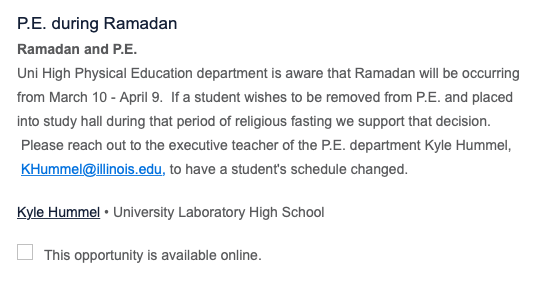Uni High Governing Board seeks to define itself and prioritize student voices
When the strategic vision task report was released in the spring of 2017, many Uni students felt it failed to adequately include the voices of current students. But the newly-formed governing board is focused on prioritizing the Uni community while advocating for Uni’s welfare.
“I see my role as trying to inform myself as best I can about what goes at Uni,” said Janet Barrett, chair of the board. “Then […] we can keep those things at the forefront of the picture.”
Barrett is a professor of music education at the University of Illinois. Although she had no prior relationship with Uni, her substantial background in education made her a strong choice for the position.
“The university wants to establish more visibility for Uni at the university level,” Barrett said. “Even though Uni High has been in existence for a very long time, there wasn’t a group with its welfare right at the top […] I think of it as parallel to how a school board would work.”
‘School board’ is an apt descriptor for the group, which meets monthly and consists of Uni faculty, parents, community members, and representatives from the University of Illinois. Although Uni has had a flourishing parenting-faculty organization (PFO) and a strong administration, it lacked a body focused on its broader welfare. But before the board takes any significant action, it needs to gather as much information about Uni as possible.
“One thing the governing board is very interested in is the voices of the students, directly from the students — not through your parents, not through your teachers. So I think part of the fact-finding mission is really trying to get as much information from as many different people [as possible],” said Amy Santos.
Santos is the link between the provost’s office — the division of the University of Illinois that runs Uni — and Uni itself. She is an ex officio member of the board, meaning that while she is present for the meetings and may comment, she does not vote. Like Barrett, Santos has a strong background in education; prior to working in the provost’s office, she spent over a decade at the university as professor in special education.
Both Santos and Barrett have engaged in substantial outreach to the Uni community. The two have met with the parent-faculty organization, and Santos led an open discussion with the faculty. Barrett has sat in on multiple classes and plans to meet with the faculty next month.
They also plan to reach out to students. “One thing we’ve all said is that we want to come to events at this school,” Barrett said. “We hope that students know us by face as well as by name.”
According to Santos, the governing board’s formation was, in part, due to a need to analyze the many recommendations of the task report. “One of the things [Provost Wilkin] wanted to do from the strategic vision task report was bring in a governing board to help them think about the plan for the other pieces of the recommendations,” Santos said.
But because the board is still in the early stages of definition and research, it will be a long time before any of the most drastic recommendations within the task report are considered. In an interview, Dr. Walkington stressed that, for example, discussion of eliminating the subbie class will come far in the future, if it arises at all. Similarly, Barrett noted that drastic changes in the admissions scheme of Uni, such as reserving spaces of children of University of Illinois faculty or students from underprivileged backgrounds, would only come after intense and prolonged research.
“Before any recommendations would ever come about admission or proportions of people or the diversity […] there would be lots of info gathering. Talking to parents, talking faculty, talking to alumni, students, right, we would do our homework and not just sit in a conference room somewhere and make decisions on behalf of Uni, we’re not going to do that,” Barrett said.
The million-dollar deficit also played a role in the development of the governing board.
“That’s part of the things that the board has to talk about, is how can we help Uni to plan to pay down the deficit, and how to make sure that Uni can continue to provide the services, to do well for its students without cutting anything and to pay back its loan,” Santos said.
So far, response to the governing board’s action has been positive.
“I’m impressed with [Santos and Barrett],” said Steve Rayburn, freshman English teacher. “They want to assess situations, they want to gather information, to find out what Uni is and then what Uni might. I was impressed by both of them by how studied they are in approaching this.”
Nathalie Stein is a current senior. She enjoys writing things, researching things and avoiding the common app.
I started journalism 2nd semester Junior year and have fallen in love since. I love photography, and video production. I love cute puppies, and Korean...

